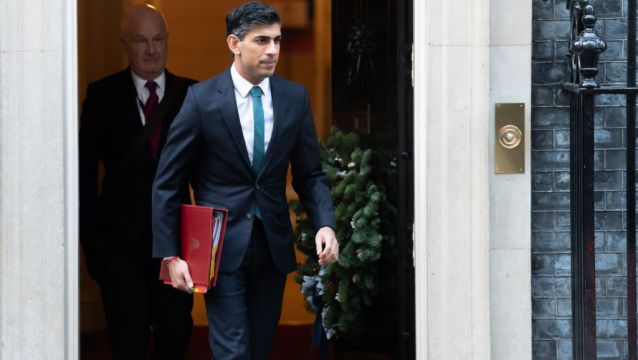It would be “completely reasonable” for the UK government to consider blocking new gender reforms in Scotland, the British prime minister has said.
Holyrood passed the Gender Recognition Reform (Scotland) Bill on Thursday following an intense week of debate, making it easier for trans Scots to obtain a gender recognition certificate (GRC).
But within hours, UK ministers were hinting they may step in to block the reforms, with Scottish secretary Alister Jack going as far as saying he may invoke section 35 of the Scotland Act, which gives him an effective veto on laws he believes impact on reserved matters.
Speaking during a visit to a homeless shelter in London, Rishi Sunak said: “Lots of people have got concerns about this new Bill in Scotland, about the impact it will have on women’s and children’s safety.
“So I think it is completely reasonable for the UK Government to have a look at it, understand what the consequences are for women and children’s safety in the rest of the UK, and then decide on what the appropriate course of action is.”
Equalities minister Kemi Badenoch also said the UK government was “looking at provisions that can prompt reconsideration” of the reforms.
Scottish social justice secretary Shona Robison said on Friday that the Scottish government will fight any attempt to block the legislation – setting up a potential collision course in the courts.
“The Bill as passed is absolutely within legislative competence and of course was backed by an overwhelming majority with support from all parties,” she said on BBC Radio Scotland.
My statement on the Scottish National Party’s Gender Recognition Bill which passed today. I was disappointed to see sensible amendments to this bill voted down and believe MSPs need more time to address outstanding concerns. pic.twitter.com/AtZCAHisGA
— Kemi Badenoch (@KemiBadenoch) December 22, 2022
Advertisement
“I think any attempt by the UK Government to undermine what is, after all, the democratic will of the Scottish Parliament, it will be vigorously contested by the Scottish Government.”
Opponents of the legislation fear that it will impact on the Equality Act, particularly in relation to the exemption which allows for trans people to be excluded from single sex spaces in some circumstances.
The Bill, the Scottish government says, will have no impact on the exemptions or the wider Equality Act – which is reserved to Westminster.
Passed by a margin of 86 votes to 39 on Thursday, the Bill will make it easier for trans people to obtain a GRC by removing the requirement for a diagnosis of gender dysphoria.
I welcome Scotland’s new law #GRRBill adopted today by @ScotParl introducing legal #GenderRecognition based on self-determination. Nine @coe states have already adopted such laws & several others under consideration. Key trend for full realisation of trans people’s #HumanRights. pic.twitter.com/1QpbJOIBQw
— Commissioner for Human Rights (@CommissionerHR) December 22, 2022
It also lowers the minimum age for applicants to 16 and drops the time required for an applicant to live in their acquired gender from two years to three months – six for those aged 16 and 17 – though with a three-month reflection period.
MSPs embarked on an intense debate on the Bill this week, spending more than 24 hours on the consideration of amendments and the final vote.
The legislation also prompted MSPs across the chamber to vote against their party, with nine SNP MSPs – including former minister Ash Regan – defying the party whip. Labour’s Carol Mochan and Claire Baker did the same, and resigned from their frontbench positions.
Former Scottish Tory leader Jackson Carlaw joined Jamie Greene in voting in favour of the Bill, but the party had declared a free vote on the issue.
Meanwhile, Dunja Mijatovic, the commissioner for human rights at the Council of Europe, welcomed the passage of the Bill.
“I welcome Scotland’s new law adopted by the Scottish Parliament introducing legal gender recognition based on self-determination,” she said.
“Nine Council of Europe member states have already adopted such laws and several others have this under consideration.
“A key trend for the full realisation of trans people’s human rights.”







